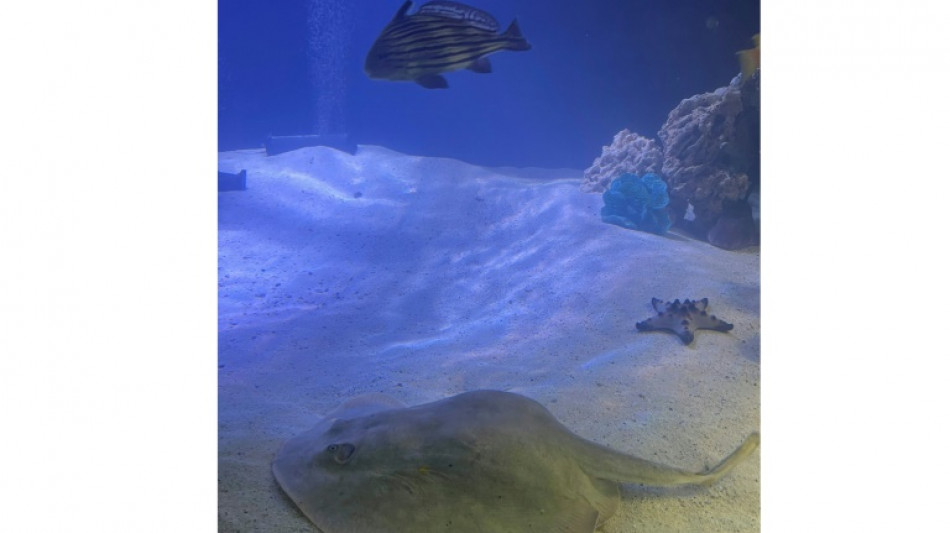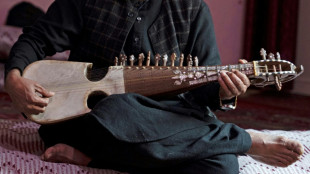
-
 Japan's Wajima craftmakers see hope in disaster-hit region
Japan's Wajima craftmakers see hope in disaster-hit region
-
Five events to look out for in 2025

-
 Five sports stars to watch in 2025
Five sports stars to watch in 2025
-
Plane with 181 on board crashes in South Korea, killing 29

-
 UNESCO-listed musical instrument stifled in Afghanistan
UNESCO-listed musical instrument stifled in Afghanistan
-
Excited Osaka says 'deep love' of tennis keeps her going

-
 Baseball superstar Ohtani expecting first baby
Baseball superstar Ohtani expecting first baby
-
For German 'sick leave detective', business is booming

-
 Konstas, Khawaja fall as Australia extend lead to 158 over India
Konstas, Khawaja fall as Australia extend lead to 158 over India
-
Impressive Herbert leads Chargers into playoffs, Broncos denied

-
 One dead in Ecuador, Peru ports closed amid massive waves
One dead in Ecuador, Peru ports closed amid massive waves
-
NBA hand out suspensions after fracas in Phoenix

-
 Atalanta snatch late draw at Lazio to hold Serie A lead
Atalanta snatch late draw at Lazio to hold Serie A lead
-
Trump sides with Musk in right-wing row over worker visas

-
 Suriname rules out state funeral for ex-dictator Bouterse
Suriname rules out state funeral for ex-dictator Bouterse
-
Alisson tells title-chasing Liverpool to create own history

-
 Israel army says ends raid against 'Hamas centre' in north Gaza hospital
Israel army says ends raid against 'Hamas centre' in north Gaza hospital
-
French skier Sarrazin 'stable' after surgery for crash injuries: federation

-
 Israeli military confirms north Gaza hospital chief held in raid
Israeli military confirms north Gaza hospital chief held in raid
-
Abbas, Shahzad rock South Africa at start of chase

-
 US deported record 61,680 Guatemalans in 2024: agency
US deported record 61,680 Guatemalans in 2024: agency
-
Double centurion Shah inspires Afghanistan fightback in Zimbabwe

-
 Diallo wants to make 'history' with struggling Man Utd
Diallo wants to make 'history' with struggling Man Utd
-
Putin apologises to Azerbaijan without claiming responsibility in plane crash

-
 Guardiola won't quit troubled Man City
Guardiola won't quit troubled Man City
-
Gaza child amputees get new limbs but can't shake war trauma

-
 Evergreen Brignone powers to Semmering giant slalom win
Evergreen Brignone powers to Semmering giant slalom win
-
Thousands in Georgia human chain as pro-EU protests enter 2nd month

-
 Turkey's pro-Kurd party meets jailed PKK leader
Turkey's pro-Kurd party meets jailed PKK leader
-
WHO chief says narrowly escaped death in Israeli strikes on Yemen airport

-
 Swiss Monney takes maiden World Cup win in Bormio downhill
Swiss Monney takes maiden World Cup win in Bormio downhill
-
De Minaur wins but Australia crash to Argentina at United Cup

-
 EU universal charger rules come into force
EU universal charger rules come into force
-
Evenepoel targets return in time for Ardennes classics

-
 Duffy bowls New Zealand to T20 victory over Sri Lanka
Duffy bowls New Zealand to T20 victory over Sri Lanka
-
Turkey's pro-Kurd party to meet jailed PKK leader on Saturday

-
 Gaza hospital shut after Israeli raid, director held: health officials
Gaza hospital shut after Israeli raid, director held: health officials
-
Surgery for French skier Sarrazin 'went well': federation

-
 Mitchell, Bracewell boost New Zealand in Sri Lanka T20
Mitchell, Bracewell boost New Zealand in Sri Lanka T20
-
Kyrgios says tennis integrity 'awful' after doping scandals

-
 S. Korean prosecutors say Yoon authorised 'shooting' during martial law bid
S. Korean prosecutors say Yoon authorised 'shooting' during martial law bid
-
Vendee Globe skipper Pip Hare limps into Melbourne after dismasting

-
 Reddy's defiant maiden ton claws India back into 4th Australia Test
Reddy's defiant maiden ton claws India back into 4th Australia Test
-
Doubles partner Thompson calls Purcell doping case 'a joke'

-
 Reddy reaches fighting maiden century for India against Australia
Reddy reaches fighting maiden century for India against Australia
-
Sabalenka enjoying 'chilled' rivalry with Swiatek

-
 Political turmoil shakes South Korea's economy
Political turmoil shakes South Korea's economy
-
New mum Bencic wins first tour-level match since 2023 US Open

-
 'Romeo and Juliet' star Olivia Hussey dies aged 73
'Romeo and Juliet' star Olivia Hussey dies aged 73
-
Brown dominates as NBA champion Celtics snap skid

| RBGPF | 100% | 59.84 | $ | |
| RELX | -0.61% | 45.58 | $ | |
| NGG | 0.66% | 59.31 | $ | |
| RYCEF | 0.14% | 7.27 | $ | |
| VOD | 0.12% | 8.43 | $ | |
| BP | 0.38% | 28.96 | $ | |
| GSK | -0.12% | 34.08 | $ | |
| SCS | 0.58% | 11.97 | $ | |
| BTI | -0.33% | 36.31 | $ | |
| CMSC | -0.85% | 23.46 | $ | |
| RIO | -0.41% | 59.01 | $ | |
| BCC | -1.91% | 120.63 | $ | |
| CMSD | -0.67% | 23.32 | $ | |
| BCE | -0.93% | 22.66 | $ | |
| AZN | -0.39% | 66.26 | $ | |
| JRI | -0.41% | 12.15 | $ |

'Virgin' stingray expecting offspring in small-town US aquarium
A stingray housed in a small-town aquarium in the United States is expecting offspring without ever having shared a tank with a male of her kind, making her not just a local sensation but a scientific curiosity.
Charlotte, who has been at the Aquarium & Shark Lab in Henderson, North Carolina for more than eight years, started showing an unusual growth on her body around late November. Staff were initially worried she might have a tumor.
"Her hump just started growing and growing, and we thought that it could be potentially cancer," Kinsley Boyette, the aquarium's assistant director and Charlotte's longtime caregiver, told AFP. Such cysts are known to sometimes form in the reproductive organs of rays when they don't mate.
The team performed an ultrasound and sent the results to scientists, who confirmed that Charlotte was carrying eggs. Subsequent scans even revealed tiny flapping tails.
Charlotte, a California round stingray thought to be 12- to 14-years-old, could give birth to her "pups" any day now (such virgin births being exceedingly rare, the gestation period might vary from the normal three to four months).
In any case, anticipation has been building in the local community.
After lengthy renovations, the aquarium reopened on Thursday, "and just about everybody coming through our door wanted to see Miss Charlotte -- it's very, very exciting," said Boyette.
- 'Loves the attention' -
Beyond her unusual pregnancy, Charlotte, who's around the size of a dinner plate and lives alongside five small sharks, charms members of the public with her winsome personality.
"I got in the tank with her this morning and she was just doing laps -- she was doing circles because we had a class here of kiddos and she absolutely loves the attention," said Boyette.
She said Charlotte would come up to the glass if approached and, when her favorite people enter the tank, enjoys cuddles.
She also loves crawfish -- an occasional treat -- along with her regular diet of shrimp, oysters and scallops.
"She's just a silly girl, she's very sweet," Boyette said.
Round stingrays hatch their eggs internally before giving birth to anywhere from one to four pups.
The odds of health issues and death rise in virgin births, experts say.
Charlotte now lives in a 2,200-gallon tank (8,300 liters) -- roughly the size of a small dumpster -- but since she is thought to be carrying up to four offspring, the aquarium hopes to be able to double the size of her tank if all goes well.
- Asexual reproduction -
The ability of breeding species to reproduce without male genetic contributions was long considered exceedingly rare, but in recent years has been documented in many vertebrates including birds, reptiles and fish -- though not mammals.
"To quote Jurassic Park, life finds a way," Bryan Legare, manager of the shark ecology program at the Center for Coastal Studies in Provincetown, Massachusetts told AFP.
Reproductively viable animals prevented from mating in captivity will sometimes undergo a process called parthenogenesis, he explained.
This means that small cells called "polar bodies," formed at the same time as eggs that normally disintegrate, instead go on to re-merge with the egg, providing the genetic material needed to create a viable embryo.
It's not clear how often it happens, Legare added: a case involving sharks or rays in aquariums gets reported every year or two. It may also happen in the wild, though this could not be confirmed without genetic testing.
Scientists note that while sexual reproduction is beneficial for evolution, it comes at the cost of first having to find a mate.
"With parthenogenesis, you see the advantage, you can be single on Valentine's Day," said Legare.
S.Pimentel--PC




